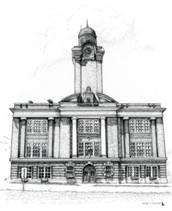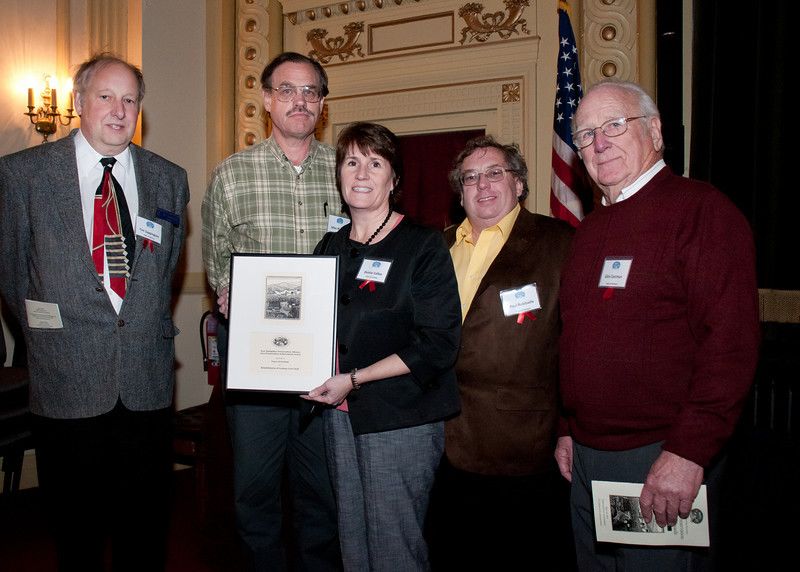Town Hall Renovation Project

The Gorham Town Hall has been the political and cultural center of the community since its construction in 1918. The building is done in brick in a Colonial Revival Style and measures 80’ x 78’, three stories tall, with a 40’ clock tower off the roof. It was constructed on the site of two previous Opera Houses that had recently burned in quick succession. Built at the end of the Great War and in the midst of a devastating Influenza outbreak, it was an unlikely project in an inopportune time. In spite of all this, the Town chose to look toward its future and invest scarce funds in what became the Town’s first publicly-owned meeting house that served as meeting space for Town functions, the Free Mason’s and the Theater. Our town prospered and grew and the optimism that guided the town in 1918 seemed obvious in retrospect.
From the mid 1980’s, however, optimism was in short supply. In 25 short years, the Town has seen its primary industries of shoe manufacturing and then timber and paper fail. As the economy skidded, the Town Hall found itself to be a worn and tired structure that could no longer meet the needs of the Town or meet current codes. The time had come to invest in the old building, but the timing for a major expenditure couldn’t have been worse. The fix came in the form of an architectural proposal that was specified to meet the required needs with nothing extra. One of the extras that couldn’t be afforded was the retention of its native yellow birch and hard maple floors, doors and casework that were found in every room except the police station. The bare bones, $2.3 Million estimate required bonding and the draining of capital reserves and most of the Town Forest Fund. When the bond finally passed on the second attempt and construction began, major problems were discovered. The previously burned structures were hidden under the sagging floors of the building as were an active sewer line, asbestos in the clock tower, defective framing, and a general level of decay which could not be covered up and forgotten. The cost as drawn went to $3 Million.
The Board of Selectmen took an unprecedented approach to complete the project. The Town became its own general contractor, hired crews and sub-contractors, bought its own materials, used Town forces where possible, began a fundraising effort, solicited federal funding first through USDA, then through a bill sponsored by Congressman Hodes’ office which was cut, and finally through Senator Shaheen’s office for a HUD - EDI Special Project Grant which was awarded, along with seeking other public funds. Over $445,000 was raised through grants as well as corporate and private donations. Most importantly, the Town engaged the Northern NH Correctional Facility for a labor source. Inmates dismantled the old Town Hall, saving the yellow birch, maple or Douglass fir trim, wainscoting and doors, and then sent a full 60’ trailer of wood to the prison for sanding and finishing. When the trim, wainscoting and doors came back, they reinstalled what had been salvaged and used new wood to replicate the old style where necessary. They applied new plaster to the 25’-high ceiling of the auditorium, framed, insulated, and applied drywall and paint, laid hardwood maple flooring throughout the upper floors, and all the wood, old or new, received a fire-rated finish. They assisted the electrical, plumbing, HVAC, and other professional tradesmen where possible. This effort has taken just over five and one half years for what was supposed to be a one-year project. The result has been estimated by contractors and others as being worth anywhere from $5-$8 Million as built
The Town of Gorham was awarded a 2011 Preservation Achievement Award by the NH Preservation Alliance on May 10, 2011 for the Town Hall Renovation Project.

Tim Sappington, Architect; Michael Waddell, Project Manager; Denise Vallee, Director of Finance & Administration; Paul Robitaille, Selectmen; Glen Eastman, Community Theater Project Committee & Former Selectman




